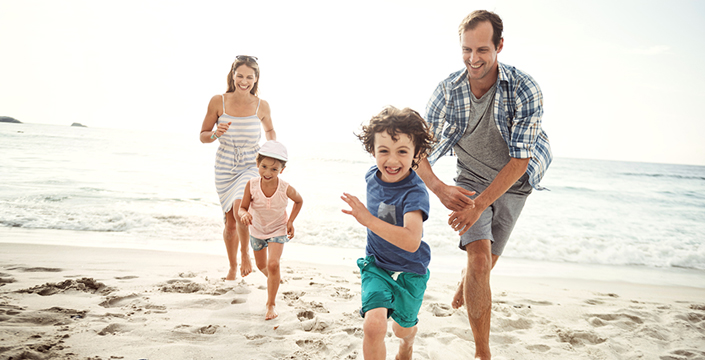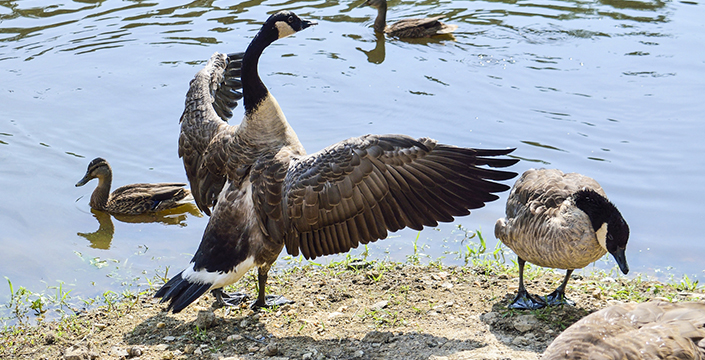
There is no better way to spend a hot summer day than on the beach. But the water quality at natural bodies of water, like beaches, can change quickly.
While on a camping trip last summer, I learned the hard way the risks that come with enjoying the beach. Some camping newbies joined us wanting to learn how to camp and get their two young children out into nature. They didn’t have any equipment so we loaned them our brand new tent and hosted them at our camp site. The site was damp from heavy rains the previous day, but drying up fast with the sunny weather. Our “city folk” friends and their children played in the shallow water and we headed out for a kayak.
All was fine until the third night when we heard a ruckus coming from their tent – our brand new tent! Both of their young children were having bouts of diarrhea and it wasn’t a pretty sight. We learned the next morning that the kids were drinking beach water from their beach toys. It was too late by then, for the kids and our tent, but I have now added “don’t drink the beach water” to my list of do’s and don’ts for new campers.
What is a natural body of water?
Naturally occurring accumulations of water, like lakes, rivers and ponds, collect surface water from the surrounding land. Man-made enclosures of water, however, like backyard pools or hot tubs, are typically filled with water by hand and are treated with chemicals to kill bacteria.
In natural bodies of water, bacteria and other harmful organisms from farm animals, birds and other wildlife and malfunctioning septic systems can be washed into our waterways. These potentially disease-causing organisms can make people sick with minor skin irritations, eye, nose, ear, and throat infections, or diarrhea – think of my friends kids!
Water quality conditions can change rapidly in a natural body of water. Environmental factors such as heavy rainfall, wind, waves, and birds can change the level of bacteria in beach water. Because of this, there is always a risk to swimming in natural bodies of water.
Public Health’s Role
A key part of Public Health’s role is to provide information to help you make informed decisions to support your health and wellbeing. In the past, Public Health has tested beach water to determine the level of E-coli – if levels were found to be above the provincial standard, Public Health would post the beach as unsafe for swimming.
This process of sampling beach water has never been a timely or practical system. Test results are received anywhere between 24 to 48 hours after a sample was collected. By the time samples are analysed and reviewed to make a decision on whether to post a beach as ‘open’ or ‘closed’, the results may not reflect the current quality of the water. It can also provide a false sense of security for beachgoers.
Because of these shortfalls, Public Health will no longer be posting beaches as ‘open’ or ‘closed’. Instead, Public Health Units and the GRCA feel that beachgoers should know before you go about the conditions you should look for so you can determine whether you want to swim in any natural water body.
What should you look for?
1. Wind and Rain
Has there been a storm in the last 24 to 48 hours? Strong wind can create waves that stir up the sand and silt from the bottom of a lake and spread bacteria, making the water look cloudy. If you can’t see your feet standing waist deep in water, don’t swim.
Heavy rain can wash animal and human waste from surrounding areas into natural bodies of water and increase the bacteria level. Don’t swim for 24 to 48 hours after a storm.
2. Wildlife
Can you see a lot of birds or animals on the shoreline? Bird and animal feces can be present in the water from wildlife that live in the water (like geese or beavers) or from run-off from the surrounding shore, particularly after it rains. Do not go in the water.

3. Shallow Water
Will you or your kids be swimming in shallow water? Shallow water is warmer than deep water, making it a good breeding ground for bacteria – the same goes for wet sand. Make sure you and your kids wash your hands or use hand sanitizer after playing in shallow water.
4. Crowded Beach
Is the beach full of people? On hot days, weekends, and holidays, people flock to beaches to cool off – more people can lead to unhygienic conditions and more bacteria in the water from human waste.
Finally, always remember – don’t swallow the water at the beach!
Visit the Beaches section of our website or follow us on Facebook or Twitter for more information.
